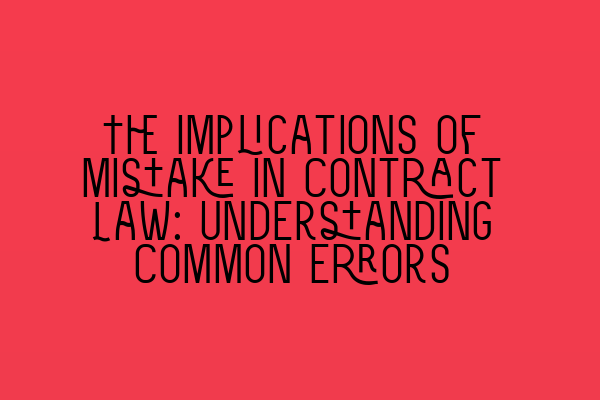The Implications of Mistake in Contract Law: Understanding Common Errors
Contract law is an essential aspect of legal practice, and understanding the implications of mistake in contract law is crucial for both solicitors and clients. A mistake in a contract can have serious consequences, leading to disputes and potential legal action. In this article, we will explore common errors in contracts and their implications, providing an invaluable resource for those navigating the complex world of contract law.
Types of Mistakes in Contracts
Mistakes in contracts can arise in various forms, but they generally fall into three categories: unilateral mistake, mutual mistake, and common mistake.
1. Unilateral Mistake
An unilateral mistake occurs when only one party is mistaken about a term or aspect of the contract. This type of mistake may be binding on the mistaken party unless the other party knew or should have known about the mistake. In such cases, the mistaken party may seek to rectify the error through legal means, such as a claim of misrepresentation or undue influence.
2. Mutual Mistake
A mutual mistake arises when both parties to a contract are mistaken about a fundamental aspect of the agreement. In these situations, the contract may be voidable, and either party can seek rescission or reformation. Rescission involves canceling the contract, while reformation aims to correct the mistake and rewrite the terms of the agreement to reflect the parties’ true intentions.
3. Common Mistake
A common mistake occurs when both parties share the same mistaken belief about a fundamental aspect of the contract. In such cases, the contract is typically void ab initio (from the beginning) as it lacks proper consent. The affected parties can usually seek restitution to restore their positions to what they were before entering into the contract.
Implications of Mistake
The implications of mistake in contract law extend beyond the initial error. They can result in disputes, litigation, and financial consequences for the parties involved.
1. Breach of Contract
If a party to a contract realizes the mistake and refuses to fulfill their obligations, it may lead to a breach of contract. A breach entitles the non-breaching party to damages, which aim to compensate for any loss suffered as a result of the breach. Understanding the implications of mistake is essential for both parties to mitigate the risk of breaching the contract.
2. Legal Remedies
Parties affected by a mistake in a contract may seek legal remedies to rectify the situation. Depending on the circumstances, these remedies may include rescission, reformation, or specific performance. Rescission cancels the contract, reformation alters its terms, and specific performance compels a party to fulfill their contractual obligations.
3. Reputation and Trust
Contracts are not only legally binding documents but also important for maintaining a positive reputation and fostering trust. If a party is found to have made a mistake that significantly impacts the contractual relationship, it may harm their reputation and future business prospects. Therefore, understanding and preventing mistakes in contracts is crucial for building trust and maintaining a reputable image in the legal community.
Conclusion
Mistakes in contracts can have far-reaching implications in contract law. Understanding the various types of mistakes and their consequences is vital for both solicitors and clients. By being aware of these common errors and taking necessary precautions, such as seeking legal advice and practicing due diligence, parties can minimize the risk of mistake and protect their interests.
For further reading and preparation for the SQE exams, check out these related articles:
